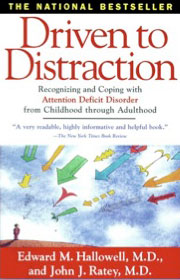Now that ADHD Awareness Month is here, I’d like to take this time to share how I feel about ADHD. I’d also like encourage you to learn more about ADHD and share what you learn with others.
You see, I have ADHD myself and I treat hundreds of people who have it at my centers in Boston MetroWest and New York City every year. And with my buddy, John Ratey, I have written several books about it.
I have a love affair with ADHD.
Would you mind if I didn’t call ADHD ADHD in this piece? I really dislike the term. Please don’t tell the Thought Police that I have strayed from the DSM-IV. Just indulge this aging lover in his love and let him—me—call ADHD something else.
How about Turbo?
I choose Turbo because having this condition is like having a turbo-charged brain. I do not see Turbo as a disorder, but rather as a condition, or a trait. Of course, I know there are important reasons to consider it as a disorder. Mainly having to do with getting accommodations, research funding, and insurance reimbursement—but for my little love letter here, let me refer to my love as a trait, okay?)
The Turbo brain is so unpredictable. One minute it gets you into trouble, the next minute it gives you the smartest idea you’ve ever had. It speaks out of turn, when it should hush up, and when others wish it wouldn’t. Furthermore, the Turbo brain speaks when it wishes it wouldn’t.
Alas, the Turbo brain also forgets. Oh, does it ever forget. And it remembers just a minute or two too late. The Turbo brain often gets yelled at, or gets reprimanded, lectured, scorned. It gets remediated, medicated, or even detonated, so that it explodes! When it explodes, of course, there is a mess. And then there is a mess to clean up. Sometimes the owner of the Turbo brain lives life from mess to mess.
Of course, the Turbo brain knows enthusiasm like few other brains ever do, but it also knows disappointment too well, too. The Turbo brain tries—oh, boy, does it ever try—but then it shows up at the wrong place on the wrong day with hat in hand, ready for another reprimand.
So it’s no surprise that the Turbo brain cannot conform. It loves its own way too much. It loves to go where enchantment leads it, and once caught up in a mind-riff it can’t say no—because it forgets where it is and what the world is waiting for.
The reason I love the Turbo brain is the same reason I love anyone or anything that has to overcome great odds. The deck is stacked against the Turbo brain, especially in school. But I also love it because at times it can be so marvelous. It has to persist, and not believe all the nasty things that get said about it, if it is to do well over the long haul.
Can it do well? Oh, can it ever!
What do you need to do to give yourself the best chance of doing well if you have a Turbo brain?
You need, above all else, in as many positive ways as you can, to CONNECT.
- Connect up with a mentor who sees your hidden skills and talents and can help draw them out of you.
- Find someone, somewhere who gets such a kick out of you that they just can’t help but smile when you walk into the room, even if you have your pants on backwards and you’re an hour-and-a-half late.
- Have a hobby that you get lost in, like building engines; or a sport you’re awesome at, like wrestling; or a horn you like to blow.
- Get a pet who loves you and you love back, in spite of poops.
- Discover a place where you can relax. Someplace where you connect to the vibes of whatever is true and good and fine in the life you live.
- Connect to hope.
- Spend time in Nature, at the sea or on a mountain or in the sky. Feel how much like Nature is your Turbo brain.
- Connect to love and disconnect from all the nasties that nibble at you like gnats.
- Give what’s best in you but you don’t know what it is a chance to grow. You do this by finding the right gardener.
The right gardener is out there. He or she is not always easy to find, as right gardeners don’t turn up as often as one would hope. But when you find the right gardener—the one who sees you’re not a weed but a most unusual plant—then your hard work will turn you into the great tree you were meant to be.
Having a Turbo brain can be hard. Having a brain—period—can be hard. But, I can tell you, as one who has a Turbo brain, I wouldn’t trade it for the world.
After all, it has given me my world—my loves of many kinds—and even if it is not there when I need it, it takes me where, without it, I could never go.
 The month of October is ADHD Awareness Month. It also marks the 25th anniversary of the publication of Driven to Distraction.
The month of October is ADHD Awareness Month. It also marks the 25th anniversary of the publication of Driven to Distraction.





